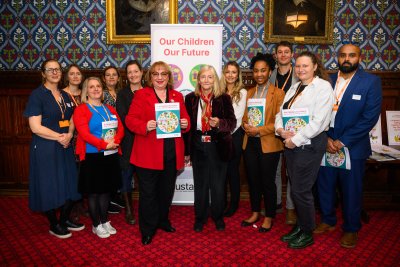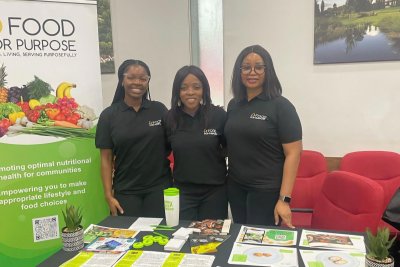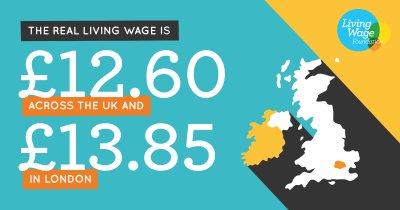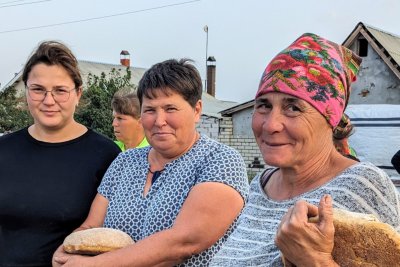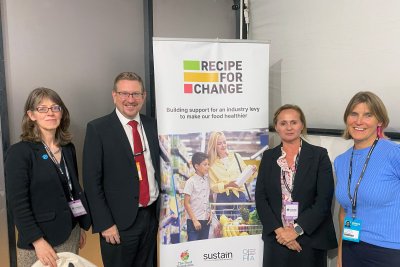A note on language: food poverty refers to the food-dimension of poverty, or the impacts on diet, nutrition and food access caused by living in poverty, and often goes hand in hand with difficultly affording other essentials such as energy costs and housing costs. The term food insecurity is often used interchangeably and refers to not having access to sufficient quantity and quality of food to meet people's needs and preferences in a dignified manner. Food insecurity is a spectrum, with mild food insecurity seeing people worrying about running out of money for food, moderate seeing people make substantial changes to their diet and potentially skipping meals, and severe food insecurity seeing people go hungry and/or relying on emergency food support.
Food Poverty in London
When I started my training to become a dietitian at King’s College London University in 2013, I had ambitions for a career in Global Health and development. However, when during my first year I started volunteering at my local food bank and debt advice centre, I was shocked to discover the levels of food insecurity in London, which has driven my work here ever since. Over the last 10 years, I have watched food insecurity rising in London alongside the Universal Credit rollout and expanding austerity measures. The people I supported as a dietitian struggled to afford a healthy diet on Universal Credit, particularly when experiencing sanctions and deductions, and on the low paid employment and zero hours contracts that many people were taking on. During the Covid-19 pandemic issues with food access multiplied and demand for charitable food aid soared, and has continued to worsen throughout the cost-of-living crisis we are living through now.
London remains one of the most unequal parts of the country, with 25% of Londoners and 33% of children living in poverty after housing costs, with nearly 50% of children living in poverty in some boroughs. Trust for London’s cost of living tracker shows that the crisis has not hit all families equally, with households in the lowest income category spending 10% more of their total expenditure on food and 4% more on energy costs than households in the highest income category. The Trussell Trust food bank network distributed 384,477 food parcels in 2022/23 across London – 100,000 more than the previous year - of which 145,575 parcels were for children. As demand for emergency food aid has continued to rise, these bleak statistics beg the question, how can we move forwards and tackle the root causes of food poverty?
The Beyond the Food Bank Approach
To see a meaningful reduction in poverty in the UK, we need systemic change at a national level, with social security payments and wages matching the cost of living, and ambitious policies and strategies removing barriers and addressing inequality. This said, we understand the transformative change that can take place in an area working in partnership with the community to address local food issues. While we continue to call for necesaary measures from the national government, we look to the role of local authorities, and Sustain’s Food Poverty Campaign to ask what can be done locally to address food insecurity?
Local Action
Sustain works with councils, food partnerships and other networks and organisations in London to promote policy and practice that goes further than the provision of emergency food, towards a future where people are not reliant on emergency food support. Since 2015, Sustain has been tracking and benchmarking council work in London which addresses the causes of food poverty at a local level through our annual Good Food for All Londoners report. We promote the following actions as making meaningful differences:
1. Partnership work
Joined-up, collaborative action is vital to moving forwards with work on food across the capital. Where key stakeholders are brought together in an area to form alliances and partnerships that work together to tackle food system issues including food security, we see innovation and best practice on all aspects of healthy and sustainable food, which translates to higher scores in the report. London now has 9 Food Partnerships which are members of the Sustainable Food Places network, with several more partnerships developing, and many taking part in the GLA's upcoming Food Roots 2 programme to develop resilience of food partnerships. Good practice is driven by the strategic work carried out by these networks, with a growing number of London councils and Food Partnerships now developing comprehensive Food Strategies, and action plans to tackle food issues including food poverty.
2. Children’s Food
Nutrition during childhood is key to healthy development, and with food insecurity higher among households with children, and rising cases of obesity and tooth decay in children, there is a need for ambitious work on children’s food.
Universal free school meals (UFSM) are key to ensuring every child has access to a nutritious meal each school day. Beyond supporting the households that are struggling financially, universal approaches have been shown to reduce health inequalities, increase intake of fruit and vegetables and prevent diet-related disease, and an increased uptake of school meals is associated with higher educational attainment and lifetime earnings. Four London councils (Islington, Newham, Southwark and Tower Hamlets) have been providing UFSM in primary schools for a number of years, with Westminster rolling them out in January 2023, and Camden committing to continue funding UFSM beyond the Mayor of London’s emergency funding for all primary schools in London for the 2023/24 academic year. We are calling for continuation of this funding, as well as work to ensure high quality healthy and sustainable meals are provided.
The Healthy Start scheme supports households on low incomes during pregnancy and with young children by providing free vitamins, and a payment card that can be used to purchase fruit, vegetables pulses, cow’s milk, and infant formula. However, in London, only 62% of people eligible are signed up to the scheme meaning 1/3 are missing out. By dedicating staff time and resources to Healthy Start, creating a local plan and increasing awareness among frontline providers, local authorities can increase uptake of the scheme. Working with local shops and markets to support them to accept Healthy Start cards also helps to expand the choice of where people can shop and keeps money within the local economy.
The UK has some of the lowest breastfeeding rates in the world with eight out of ten women stopping breastfeeding before they want to. Most London councils now have some level of UNICEF UK Baby Friendly accreditation, enabling public services to better support families with infant feeding and developing close relationships so that all babies get the best possible start in life, and three councils have a gold award (Hammersmith and Fulham, Kensington and Chelsea and Westminster). Beyond this we see innovative work such as the holistic Infant Feeding Partnership in Kingston, which includes health representatives and mothers from the borough, and Black Breastfeeding Week in Waltham Forest, supporting better infant feeding.
3. Minoritized groups
Certain groups face additional systemic and structural barriers to accessing the food they need in a dignified manner. Local authorities have scope to develop targeted support to tackle these inequalities.
The Trussell Trust report that three quarters of people referred to their food banks say that they or a member of their household are disabled. For those that need support in the home, the council can provide robust meal provision and support strong referral networks into services, as well as opportunities for those able to take part in social activities around food.
People from Black and other racialised communities are more likely to experience food insecurity than White people, relating to ongoing structural racial injustice. We encourage councils to consider diversity, equity inclusion in all policy and practice relating to food rather than in silo, including providing specific targeted support such as grants and training to organisations seeking to tackle these inequalities.
People with no recourse to public funds (NRPF), including asylum seekers and people that have been denied asylum often face severe food insecurity and barriers to accessing food that is appropriate for them. Local authorities have a role to play by widening the eligibility criteria for council support programmes, funds and food schemes to include residents with NRPF, and supporting organisations working to improve food access for these residents. Councils can also engage in our upcoming project to improve food access for asylum seekers in London.
4. Cash-first approaches to food insecurity
Sustain is a food charity, and our expertise lie in tackling the food-dimension of poverty and health inequalities through policy and practice. That said, we strongly support other organisations and Sustain alliance members who are campaigning for incomes to meet living costs. We continue to track work local authorities are doing to increase cash in people’s pockets, including measures such as crisis payments to those in need, council tax minimum payments, and funding wraparound support (including at food projects) to make it easier for people to access support such as financial advice, wellbeing services, and education and employability. The new London Living Wage will be announced Tuesday 24th October. Being a Living Wage Employer signals a commitment to pay staff the real cost of living, not just the minimum, with three London councils now recognised as having a Living Wage Place in the borough, creating and delivering a 3-year action plan aimed at making the real Living Wage the norm in their area.
Food Poverty: Millions of people in the UK struggle to get enough to eat. We’re working to change that through people-powered projects and campaigns that tackle the root causes of food poverty and ensure everyone has dignified access to healthy, affordable food.

